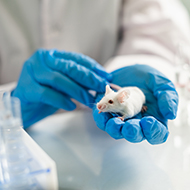Government urged to phase out animal experiments

New figures show there were 3.06 million scientific procedures completed on animals in 2021.
More than three-quarters of UK adults agree that more needs to be done to hasten the development and uptake of alternatives to replace animal experiments.
Figures from a poll conducted by the RSPCA also show that three-quarters of the UK public agree the government should commit to phasing out the use of animals in scientific research and testing.
The findings come as new Home Office statistics show there were 3.06 million scientific procedures completed on animals last year - a rise of six per cent from the 2.88 million procedures carried out in 2020.
Dr Penny Hawkins, head of the RSPCA's Animals in Science Department, urged the government to 'go further and faster' to reduce animal use or risk falling behind in the mission to end the use of animals in research and testing.
Penny said: “As one of the world’s largest lab animal users, the UK has a responsibility to lead the agenda on phasing out animal use, but we are currently in danger of being left behind by the ambition and leadership of other countries. This lack of commitment is simply not good enough, and it is clear that the public expects and wants more action."
She stressed that a strategy for phasing out animal use and bringing in humane alternative approaches is not about reventing important research but about about reducing and avoiding the negative impacts on millions of lab animals every year.
Penny continued: "The RSPCA wants to see a clear statement, and commitment, from the government, that transitioning away from animal experiments is a legitimate and desirable goal. And to help achieve this, much more focus and support will be needed around developing, validating and using Non-Animal Technologies.”



 The Veterinary Medicines Directorate (VMD) is inviting applications from veterinary students to attend a one-week extramural studies (EMS) placement in July 2026.
The Veterinary Medicines Directorate (VMD) is inviting applications from veterinary students to attend a one-week extramural studies (EMS) placement in July 2026.